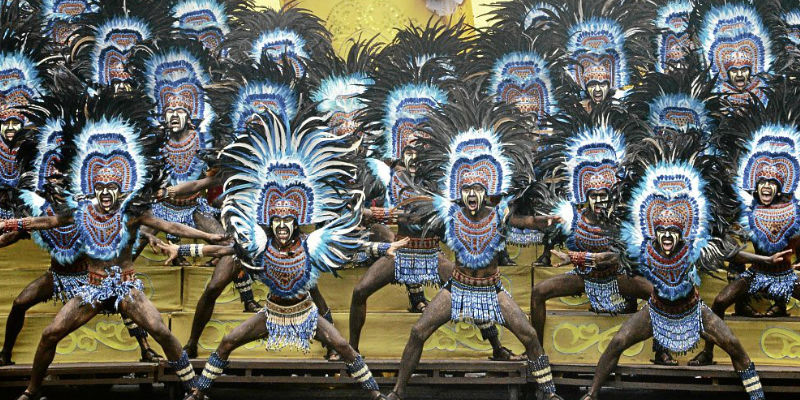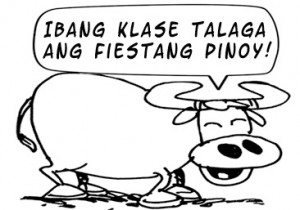Giant ‘creatures’ add thrill to Dinagyang revelry

DINAGYANG FRENZY Wearing colorful costumes, members of Tribu Salognon perform in the streets of Iloilo City during the Dinagyang, Iloilo’s top festival attraction in honor of the Sto. Niño. Ten groups joined the dancing competition. GUIJO DUEÑAS/INQUIRER VISAYAS
ILOILO CITY—Giant bees, serpents and spiders towered over the city streets on Sunday, but the hundreds of thousands of revelers who came were thrilled rather than scared by the hideous creatures.
The “creatures”—made of paper, cardboard, plastic and pieces of wood—were after all only props of groups that participated in the Ati tribe contest of the Dinagyang Festival.
The streets reverberated with sounds of drum-beatings and shouts of “Viva Señor Sto. Niño” as more than one million people, including tourists, took part in the renowned festival over the weekend.
Police and organizers said the festival drew around 1.5 million revelers during its highlights on Saturday and Sunday, surpassing the estimated crowd of 1.2 million that came last year.
Hundreds of thousands packed the streets to watch the carousel-type Ati tribe dance contest and thousands more came to watch other performances that lasted until noon.
Article continues after this advertisementThe revelries spilled over from the main streets of the city proper to the entertainment centers in other areas.
Article continues after this advertisement10 groups
There was a shortage of hotel rooms. Many guests had to stay in resorts and pension houses in neighboring towns, according to Maria Lea Victoria Lara, executive director of the Iloilo Business Club (IBC).
The performances during the Ati tribes contest on Sunday, the highlight of the festival, drew repeated applause and cheers from the audience.
The 10 groups that competed in the contest highlighted their performances with fast movements, repeated changes of stunning costumes, mobile platforms and stages, and elaborate props—including those giant bees, water serpents and spiders.
“We are continuously being invited to perform in other countries,” Mayor Jed Patrick Mabilog said.
Aquino message
In a message delivered by former Sen. Ramon Magsaysay Jr., President Aquino cited the importance of cultural festivals in nation-building.
“This year’s Dinagyang Festival brings us closer as a people,” the President said in his message. “It is by going back to the essence of our national identity—our heritage—that we gain a deeper understanding of our society, which is vital if we are to move forward together as one nation.”
Mr. Aquino added: “We have proven, time and again, that nothing is impossible to a determined and united people. We have proven that, in the face of challenges, we Filipinos can hold our heads high and smile. This festival reminds us what it means to be Filipino: To be kind-hearted, optimistic and persevering.”
The competing groups in the Ati tribe contest included Angola, Aninipay, Atub-Atub, Buntatalan-on, Ilonganon, Milagrosa, Molave, Pag-asa, Panayanon and Salognon.
Tribu Miro
The special participation of Tribu Miro, composed of members of the indigenous Ati community of Panay Island, was widely applauded.
The tribe, the only noncompeting group, was the first to perform at Iloilo Freedom Grandstand, the main judging area. They depicted their daily lives, including hunting and food gathering practices.
The Kasadyahan regional cultural competition on Saturday was also well attended, said Ben Jimena, city tourism officer.
Often playing second to the Ati tribe competition, the Kasadyahan is evolving into a festival of its own and organizers are studying plans to spin off the event into a festival separate from the Dinagyang, Jimena said.
The winners in the Kasadyahan and Ati tribe contests, who will get at least P1.75 million in total prizes, were expected to be announced last night.
1st festival
The Dinagyang, held every fourth Sunday of January, is among the festivals held in honor of the Sto. Niño.
It traces its roots to 1968, when Fr. Sulpicio Enderes, OSA, with a delegation of the Cofradia de Cebu, brought a replica of the image of the Child Jesus Señor Sto. Niño de Cebu to Iloilo City. The image was brought to San Jose Parish Church, where it is enshrined until now.
A year later, the first parish feast of Señor Sto. Niño was celebrated. The champion and runner-up in the Kalibo Ati-Atihan contest performed in what was considered the first Ati-Atihan festival in Iloilo City.
In 1970, the first Ati-Atihan contest of Iloilo was held at Freedom Grandstand. Seven years later, festival organizers changed “Ati-Atihan” to “Dinagyang” from the Hiligaynonword “dagyang,” or merrymaking.
